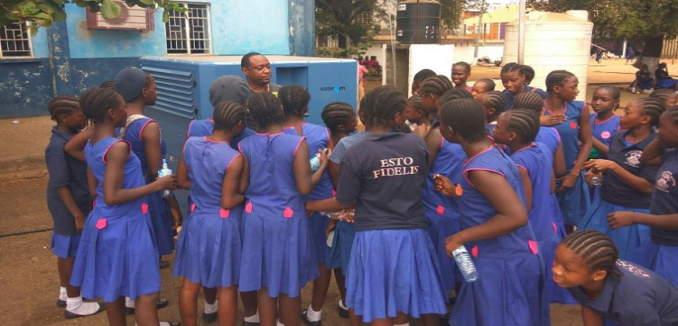Water pollution is one of the leading causes of death in the west African country of Sierra Leone, where average life expectancy is just 56 years. Now, St. Joseph School girls in the capital city of Freetown can easily access safe drinking water thanks to Israeli technology in the form of an atmospheric water generator from Watergen.
The GEN-350 can produce up to 900 liters of water per day from the humid air of Africa. The atmospheric moisture is purified through an internal water-treatment system. The unit needs no infrastructure except electricity from the power grid or from a generator.
Watergen President Michael Mirilashvili’s efforts to make fresh, pure water available around the globe earned the company a place on the World Economic Forum’s list of the world’s top technology pioneers in 2018.
Based in Rishon LeTzion, the company was founded in 2009 by entrepreneur Arye Kohavi and maintains two factories in Israel. Miami-based Watergen USA has a factory in South Carolina.
The GEN-350 in Sierra Leone was purchased by a group of donors and a local NGO from SL Watergen, a national Watergen distributor.
“Watergen USA is pleased to work with SL Watergen, which has worked with various government officials in Sierra Leone who have made clean, drinking water a priority for the new government,” said Yehuda Kaploun, president of Watergen USA.
“We thank the president, vice president and the Ministry of Water, all of whom worked with us to facilitate this project. The government is extremely pleased and looks forward to working with SL Watergen’s team to place many more of these units throughout Sierra Leone.”
Kaploun noted that Watergen is currently operating in many African countries, “and even more announcements about other countries in Africa using our machines and technology will be forthcoming.”
In Sierra Leone, approximately half the population has no access to clean drinking water, and fewer than three-quarters of urban dwellers have a safe-drinking water supply available. Sierra Leone’s water sources, which primarily consist of ponds, unprotected wells and freestanding water, have been contaminated by mining as well as chemicals used in the agricultural industry. Water-borne infections and parasites can cause typhoid fever and hepatitis A.
[Photo: Israel21c]




